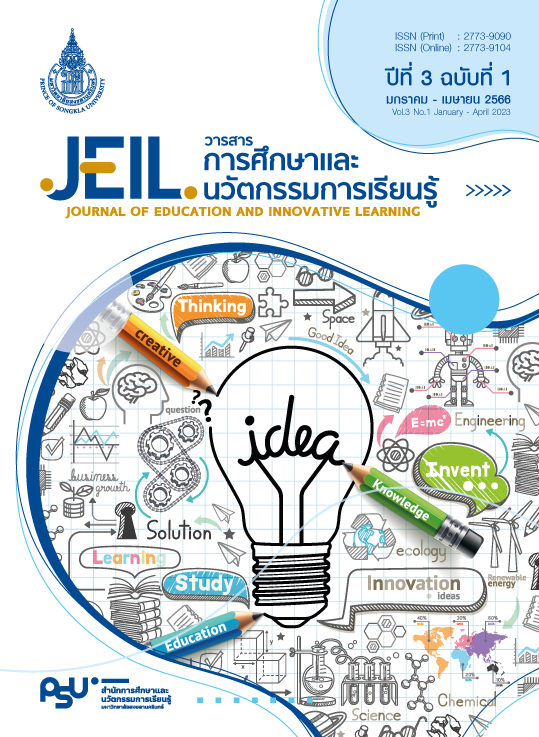การบูรณาการการสอนด้วยการใช้ปัญหาเป็นฐานเพื่อเพิ่มประสิทธิภาพการเรียนออนไลน์ ของนักศึกษาสัตวแพทย์
Main Article Content
บทคัดย่อ
ระบบสื่อออนไลน์เป็นหนึ่งเครื่องมือที่ถูกเลือกใช้ทดแทนการเรียนภายในชั้นเรียนเพิ่มขึ้นอย่างมากตั้งแต่การเกิดสถานการณ์โรคติดเชื้อไวรัสโคโรนา อย่างไรก็ตามพบว่าการเรียนบรรยายผ่านระบบสื่อออนไลน์เพียงอย่างเดียวไม่เพียงพอต่อการเรียนรู้ของนักศึกษาเมื่อเทียบกับการเรียนภายในชั้นเรียนได้ โดยเฉพาะอย่างยิ่งในวิชาชีพสัตวแพทย์ที่ต้องการทักษะวิชาชีพสูง ทั้งนี้เนื่องจากการเรียนผ่านสื่อออนไลน์ทำให้การสื่อสารสองทางระหว่างอาจารย์และนักศึกษาลดน้อยลง งานวิจัยในครั้งนี้จึงมีสมมุติฐานว่าการเสริมกิจกรรมการเรียนรู้โดยใช้ปัญหาเป็นฐาน (PBL) ในการเรียนออนไลน์จะช่วยเพิ่มประสิทธิภาพการเรียนรู้และการบรรลุผลการเรียนรู้ที่คาดหวังของรายวิชาได้มากขึ้น กลุ่มเป้าหมายนักศึกษาสัตวแพทย์ชั้นปี 4 ที่ลงทะเบียนในรายวิชาเวชศาสตร์สัตว์เคี้ยวเอื้องขนาดใหญ่และเวชศาสตร์สัตว์เคี้ยวเอื้องขนาดเล็ก ประจำปีการศึกษา 2564 ได้รับการเรียนบรรยายผ่านสื่อออนไลน์ตามกำหนดของผลลัพธ์การเรียนรู้ของรายวิชาแล้วเสริมกิจกรรม PBL ในช่วงท้ายชั่วโมงการเรียนรู้ในแต่ละหัวข้อ ทำการประเมินการนำเสนอและแสดงความคิดเห็นของนักศึกษาผ่านคณาจารย์ด้วยเกณฑ์การประเมินจำนวนสี่ด้าน ผ่านแบบสอบถามแบบรูบิค ผลการศึกษาพบว่า 1) นักศึกษามีคะแนนการเรียนรู้ทุกด้านเฉลี่ยเพิ่มขึ้น (=8.9) เปรียบเทียบกับการเรียนบรรยายผ่านสื่อออนไลน์เพียงอย่างเดียว (
=8.4) และ 2) นักศึกษามีความสนใจในการเรียนรู้ สามารถบรรลุผลลัพธ์การเรียนรู้ที่คาดหวังของรายวิชา ได้แก่ ทักษะการสื่อสารและการนำเสนอ และสามารถสรุปความคิดรวบยอดในแต่ละหัวข้อได้เพิ่มขึ้น อย่างไรก็ตามปัจจัยที่มีผลต่อความสำเร็จต้องคำนึงถึงคือ ความเหมาะสมของระยะเวลา และจำนวนนักศึกษาต่อกลุ่มในการร่วมกิจกรรม PBL
Article Details

อนุญาตภายใต้เงื่อนไข Creative Commons Attribution-NonCommercial-NoDerivatives 4.0 International License.
เนื้อหาและข้อมูลในบทความที่ตีพิมพ์ในวารสารการศึกษาและนวัตกรรมการเรียนรู้ ถือเป็นข้อคิดเห็นและความรับผิดชอบของผู้เขียน ซึ่งกองบรรณาธิการวารสาร ไม่จำเป็นต้องเห็นด้วยหรือร่วมรับผิดชอบใด ๆ และไม่สงวนสิทธิ์การคัดลอกบทความเพื่อใช้ประโยชน์ทางวิชาการ แต่ให้อ้างอิงข้อมูลแสดงที่มาของบทความทุกครั้งที่นำไปใช้ประโยชน์
เอกสารอ้างอิง
Acevedo, M. A. (2020). Teaching quantitative ecology online: An evidence-based prescription of best practices. Ecology and Evolution, 10(22), 12457-12464. doi:10.1002/ece3.6607
Allen, D. E., Donham, R. S., & Bernhardt, S. A. (2011). Problem-based learning. New directions for teaching and learning, 2011(128), 21-29. doi:10.1002/tl.465
Anderson, L. W., Krathwohl, D. R., Airasian, P. W., Cruikshank, K. A., Mayer, R. E., Pintrich, P. R., ... Wittrock, M. C. (2001). A taxonomy for learning, teaching, and assessing: A revision of Bloom's taxonomy of educational objectives. New York: Pearson, Allyn & Bacon.
Barrows, H. S., & Tamblyn, R. M. (1980). Problem-based learning: An approach to medical education (Vol. 1). New York: Springer Publishing Company.
Bloom, B. S., Engelhart, M. D., Furst, E. J., Hill, W. H, & Krathwohl, D. R. (1956). Handbook I: cognitive domain. New York: David McKay.
Edwards, J. (2004). Global perspectives of veterinary education: Reflections from the 27th World Veterinary Congress. Journal of veterinary medical education, 31(1), 9-12. doi:10.3138/jvme.31.1.9
Efriana, L. (2021). Problems of online learning during COVID-19 pandemic in EFL classroom and the solution. Journal of English Language Teaching and Literature, 2(1), 38-47.
Eyre, P. (2011). All-purpose veterinary education: a personal perspective. Journal of veterinary medical education, 38(4), 328-337. doi:10.3138/jvme.38.4.328
Kizilkaya, A., & Seven, S. (2016). The effect of problem based learning approach to the students’ high level and sub-level academic success in cognitive domain of Bloom’s taxonomy. e-Kafkas Journal of Educational Research, 3(3), 34-46.
Koskinen, H. (2007). Evaluation of the level of difficulty of patient cases for veterinary problem-solving examination: a preliminary comparison of three taxonomies of learning. Journal of veterinary medical education, 34(2), 106-111. doi:10.3138/jvme.34.2.106
Lincoln, A. E. (2010). The shifting supply of men and women to occupations: feminization in veterinary education. Social Forces, 88(5), 1969-1998. doi:10.1353/sof.2010.0043
Maher, A. (2004). Learning outcomes in higher education: Implications for curriculum design and student learning. Journal of Hospitality: Leisure, Sport and Tourism Education, 3(2), 46-54. doi:10.3794/johlste.32.78
McDermott, M. P., Tischler, V. A., Cobb, M. A., Robbé, I. J., & Dean, R. S. (2015). Veterinarian-client communication skills: current state, relevance, and opportunities for improvement. Journal of veterinary medical education, 42(4), 305-314. doi:10.3138/jvme.0115-006R
Nantavisai, S., Pagdepanichkit, S., Jattuchai, J., Sawangmake, C., Choisunirachon, N., Tiawsirisup, S., & Suradhat, S. (2022). Perspectives on veterinary education in Thailand. Journal of Veterinary Science, 23(6), e86. doi:10.4142/jvs.22114
Panyaboriban, S., Kupthammasan, N., & Wittayarat, M. (2021). Factors enhancing online learning efficiency in veterinary student classes. Paper presented at the 9th PSU Education Conference 2021: A Better Change in Higher Education for Future Economy, Songkla, Thailand. [in Thai]
Ping, Z., Fudong, L., & Zheng, S. (2020). Thinking and practice of online teaching under COVID-19 epidemic. Proceedings of 2020 IEEE 2nd International Conference on Computer Science and Educational Informatization (CSEI), 165-167. doi:10.1109/CSEI50228.2020.9142533
Preeti, B., Ashish, A., & Shriram, G. (2013). Problem based learning (PBL)-an effective approach to improve learning outcomes in medical teaching. Journal of Clinical and Diagnostic Research: JCDR, 7(12), 2896-7. doi:10.7860/JCDR/2013/7339.3787
Prince, K. J. A. H., Van Eijs, P. W. L. J., Boshuizen, H. P. A., Van Der Vleuten, C. P. M., & Scherpbier, A. J. J. A. (2005). General competencies of problem-based learning (PBL) and non-PBL graduates. Medical education, 39(4), 394-401. doi:10.1111/j.1365-2929.2005.02107.x
Stratton, B. J. (2010). The practice of problem-based learning: a guide to implementing PBL in the college classroom. Teaching Theology & Religion, 13(1), 79-80. doi:10.1111/j.1467-9647.2009.00583.x
Sweeney, G. (1999). The challenge for basic science education in problem-based medical curricula. Clinical and Investigative Medicine, 22(1), 15-22.
Toquero, C. M. (2020). Challenges and opportunities for higher education amid the COVID-19 pandemic: The Philippine context. Pedagogical Research, 5(4), em0063. doi:10.29333/pr/7947
Viner, R. M., Russell, S. J., Croker, H., Packer, J., Ward, J., Stansfield, C., ... Booy, R. (2020). School closure and management practices during coronavirus outbreaks including COVID-19: a rapid systematic review. The Lancet Child & Adolescent Health, 4(5), 397-404. doi:10.1016/S2352-4642(20)30095-X
Watson, P. (2002). The role and integration of learning outcomes into the educational process. Active Learning in Higher Education, 3(3), 205-219. doi:10.1177/1469787402003003002


